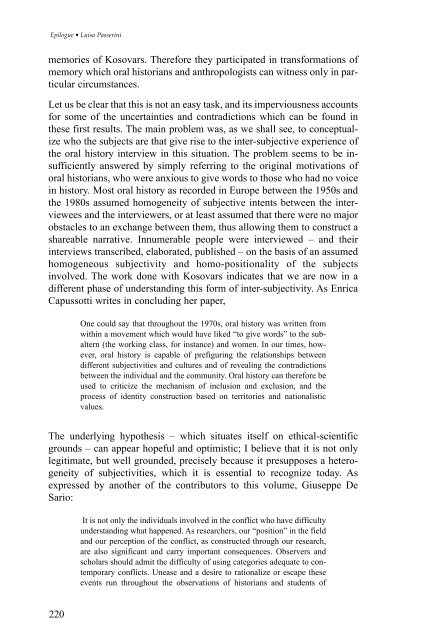Psychosocial Notebook - IOM Publications - International ...
Psychosocial Notebook - IOM Publications - International ...
Psychosocial Notebook - IOM Publications - International ...
Create successful ePaper yourself
Turn your PDF publications into a flip-book with our unique Google optimized e-Paper software.
Epilogue • Luisa Passerini<br />
memories of Kosovars. Therefore they participated in transformations of<br />
memory which oral historians and anthropologists can witness only in particular<br />
circumstances.<br />
Let us be clear that this is not an easy task, and its imperviousness accounts<br />
for some of the uncertainties and contradictions which can be found in<br />
these first results. The main problem was, as we shall see, to conceptualize<br />
who the subjects are that give rise to the inter-subjective experience of<br />
the oral history interview in this situation. The problem seems to be insufficiently<br />
answered by simply referring to the original motivations of<br />
oral historians, who were anxious to give words to those who had no voice<br />
in history. Most oral history as recorded in Europe between the 1950s and<br />
the 1980s assumed homogeneity of subjective intents between the interviewees<br />
and the interviewers, or at least assumed that there were no major<br />
obstacles to an exchange between them, thus allowing them to construct a<br />
shareable narrative. Innumerable people were interviewed – and their<br />
interviews transcribed, elaborated, published – on the basis of an assumed<br />
homogeneous subjectivity and homo-positionality of the subjects<br />
involved. The work done with Kosovars indicates that we are now in a<br />
different phase of understanding this form of inter-subjectivity. As Enrica<br />
Capussotti writes in concluding her paper,<br />
One could say that throughout the 1970s, oral history was written from<br />
within a movement which would have liked “to give words” to the subaltern<br />
(the working class, for instance) and women. In our times, however,<br />
oral history is capable of prefiguring the relationships between<br />
different subjectivities and cultures and of revealing the contradictions<br />
between the individual and the community. Oral history can therefore be<br />
used to criticize the mechanism of inclusion and exclusion, and the<br />
process of identity construction based on territories and nationalistic<br />
values.<br />
The underlying hypothesis – which situates itself on ethical-scientific<br />
grounds – can appear hopeful and optimistic; I believe that it is not only<br />
legitimate, but well grounded, precisely because it presupposes a heterogeneity<br />
of subjectivities, which it is essential to recognize today. As<br />
expressed by another of the contributors to this volume, Giuseppe De<br />
Sario:<br />
220<br />
It is not only the individuals involved in the conflict who have difficulty<br />
understanding what happened. As researchers, our “position” in the field<br />
and our perception of the conflict, as constructed through our research,<br />
are also significant and carry important consequences. Observers and<br />
scholars should admit the difficulty of using categories adequate to contemporary<br />
conflicts. Unease and a desire to rationalize or escape these<br />
events run throughout the observations of historians and students of

















